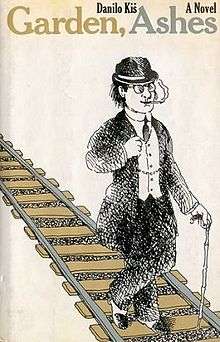Garden, Ashes

Garden, Ashes (Serbo-Croatian: Bašta, pepeo) is a 1965 novel by Yugoslav author Danilo Kiš. His third novel, it is the first of what he would call a "family cycle"; the others in that cycle are the story collection Early Sorrows (1970) and the novel Hourglass (1972).[1]
The three books focus on Kiš's childhood and his father. Kiš grew up in the Vojvodina, and his father died in Auschwitz. Part of Garden, Ashes is concerned with the child narrator's escape from the Nazis: Kiš and his mother survived the war in Hungary (as long as Hungary was not directly governed by the Nazis, the Jews there were relatively safe). Autobiographical elements underlie the novel: while the father in Garden, Ashes is called Eduard Scham, he ends up on the same train to Auschwitz as did the author's father. Still, Aleksandar Hemon argues that the book is not a "concealed memoir": it is a masterpiece in which "the experience of the Holocaust is transformed into a literary experience; it is reconstituted as simultaneously personal, historical and literary".[2]
An English translation, by William J. Hannaher, was published in 1975 by Harcourt.
Content
The narrative is told from the perspective of a young boy, Andi Schamm, who lives with his mother in Hungary. His absent father, Eduard Schamm, is a writer whose unfinished work is the third edition of a travel guide called Bus, Ship, Rail and Air Travel Guide – the updated edition, which Schamm will never complete, is to be encyclopedic in its scope, and would include "all cities, all land areas and all the seas, all the skies, all climates, all meridians".[3] The novel's title possibly derives from an accusation made by the Hungarian fascists against the father: (falsely) accused of being an Allied spy, an accusation the son wants to believe since it increases his father's heroic status, he is said to direct the Allied planes to deliver the bombs that turn "everything into dust and ashes".[4] A central object in the novel is the Singer sewing machine of Schamm's mother which, because it has created beautiful things, signifies beauty and home, but it becomes lost in the Holocaust.[3]
The novel is structured as a "loosely connected chronological sequence of half-explained adventures". Most of the focus is on the father, and what happens to the mother and child, living with difficulty in impoverished circumstances, is only partially explained. Refusing to give any moral judgment of the father, Kiš portrays him as a complex character, "enigmatic and half-crazed..., a man with an eloquent tongue and a fanciful mind who frequently abandoned family, sobriety, and reason", according to Murlin Croucher.[5]
Translation and reception
Kiš wrote the novel at age 30, and it "was greeted by the critics as a significant work by a promising young writer".[6] By the time it was translated and published in English, it had already appeared in French, German, Polish, and Hungarian.[5] English reviews were mixed but mostly positive. Murlin Croucher praised the "rich yet youthful and slightly hyperbolic style", though he felt that the book lacked an overall purpose. Croucher also remarked on the impossibility of distinguishing between fact and fiction,[5] which became a hallmark of Kiš's work.[7] Vasa Mihailovich comments on the novel's charm, which he says was unsurpassed even by Kiš's later "more sophisticated and mature books".[6]
References
- ↑ Sacks, Sam (24 August 2012). "Book Review: Psalm 44, The Attic, The Lute and the Scars". The Wall Street Journal. Retrieved 9 January 2014.
- ↑ Hemon, Aleksandar (19 October 2003). "Words that transcend the evil of the Holocaust". Los Angeles Times. Retrieved 10 January 2014.
- 1 2 David Patterson, ed. (2005). Fire in the Ashes: God, Evil, and the Holocaust. John K. Roth. U of Washington P. p. 110. ISBN 9780295985473.
- ↑ Motola, Gabriel (1993). "Danilo Kiš: Death and the Mirror". The Antioch Review. 51 (4): 605–21. JSTOR 4612839.
- 1 2 3 Croucher, Murlin (1977). "Rev. of Garden, Ashes by Danilo Kiš". World Literature Today. 51 (1): 127. doi:10.2307/40090596. JSTOR 40090596.
- 1 2 Mihailovich, Vasa D. (1977). "Rev. of Garden, Ashes by Danilo Kiš". The Slavic and East European Journal. 21 (1): 133–34. doi:10.2307/306751. JSTOR 306751.
- ↑ Gorjup, Branko (1987). "Danilo Kiš: From 'Enchantment' to 'Documentation'". Canadian Slavonic Papers. 29 (4): 387–94. JSTOR 40868819.